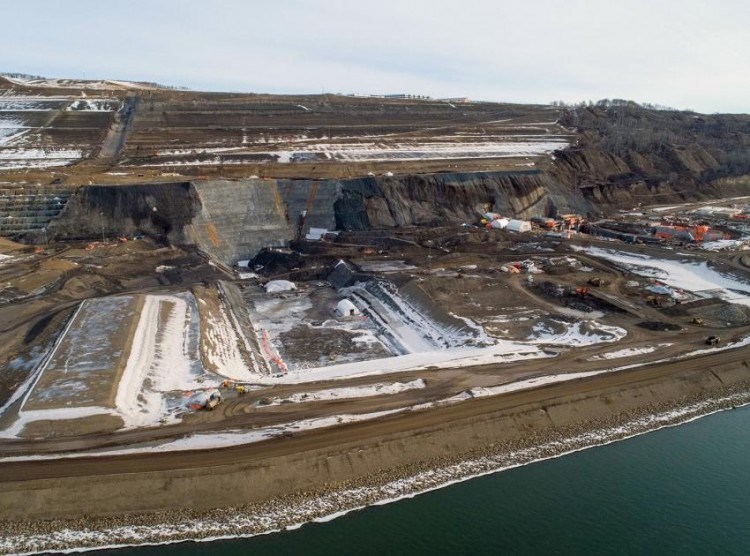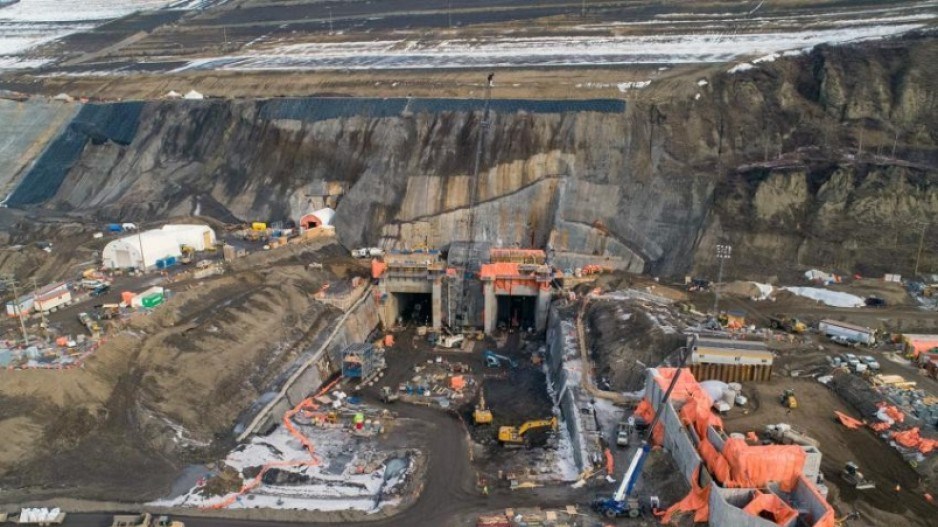Crews at Site C working through the COVID-19 pandemic will be on an extended shift rotation with overtime pay, and BC Hydro has instituted stringent new measures for access to the dam site, including mandatory temperature checks of workers.
BC Hydro has significantly cut back construction on the $10.7-billion hydroelectric project due to the pandemic, but has deemed all construction needed to divert the Peace River outside Fort St. John this fall as a critical priority. The river needs to be diverted so the actual building of the 60-metre, kilometre-long earthfill dam structure can begin.
The work is the responsibility of the main civil works contractor Peace River Hydro Partners. CLAC, the union representing those workers, says it has agreed to an extended six- to eight-week shift rotation with the company, and that members are receiving overtime pay for all hours worked. The extended shifts have not yet been implemented.
"One of the issues we know we are going to have to eventually face is that more and more limitations will be mandated by the health authorities on travel – especially air travel," said CLAC representative Curtis Haugan.
"We want to be proactive on this, and so we have agreed with PRHP on a six to eight week long shift, where workers who volunteer for the shift would stay in camp and not rotate out. The hope here is that we can weather the worst of this, while hunkering down and completing this important critical work."
Close to 1,000 workers have been sent home since a scale-back was announced March 18. As of Monday, there were just 819 workers at the camp, down from an average of 1,700 for this time of year.
Of those, four workers were in self-isolation, and BC Hydro has reserved up to 150 rooms at the camp for those who need to be quarantined when they are sick for any reason. A main 30-room isolation dormitory is being used for now.
BC Hydro says effective March 30 any worker accessing the dam site is required to have their body temperatures taken and to complete a Ministry of Health COVID-19 self-assessment to be allowed on site.
"Staff will obtain verbal consent to conduct the screening. If consent is not provided, access to site will be denied," BC Hydro said.
Any worker with a body temperature above 37.3 C, or who shows signs of symptoms or answers 'Yes' to a question on the self-assessment, will be subject to further screening at the camp's medical clinic.
Any local workers recommended for self-isolation will be allowed to return home. Out-of-town workers will be transported to the isolation dormitory for monitoring, BC Hydro said.

Dam core trench excavations nearing completion on the north bank of the Peace River at Site C, just outside Fort St. John, February 2020. - BC Hydro
CLAC says tests for the COVID-19 virus have been done on some of its members who were proactively put into quarantine, and none of those tests were positive.
BC Hydro says there are no confirmed cases at the site. Any workers with symptoms of sneezing, sore throat, muscle aches, headaches, cough fever or difficulty breathing are required to self-isolate for 10 days.
"We have been provided daily updates from Hydro on this," Haugan said.
"We were able to successfully negotiate that these members are paid for being in quarantine. We want to reduce any resistance to entering quarantine, even if their symptoms are minor."
Between 600 to 700 CLAC members are expected to remain working, and ensuring work continues safely has been the primary focus, Haugan said. That includes making sure new hand wash stations are built and that workers have proper access to disinfectant sprays or hand sanitizers, he said.
"There have been a number of hand wash stations built over the last couple days and placed across the site, and disinfectant spray and hand sanitizer are in very high demand," Haugan said.
"We have been ensuring the contractor and BC Hydro are addressing areas where there are shortages, and advising our members to cease working when they cannot do so safely."
Social distancing measures are also in place, Haugan said, including a staggered schedule to eliminate full buses to work sites, and morning meetings are held outside wherever possible.
Peace River Hydro Partners said the health and safety of its workers was top priority.
"Given these unprecedented times, PRHP is making reasonable efforts to continue to move forward while navigating this challenging and ever-changing situation," spokesperson Jamie Bodnarchuk said.
Construction on the south bank of the Peace River, where the powerhouse and spillways are being built, has been shut down.
But BC Hydro says work continues to realign Highway 29, build the Site C transmission line to Peace Canyon dam, and clear the valley and future reservoir because "the majority of these workers do not stay in the worker accommodation lodge."
Other site security and environmental monitoring work also continues.
BC Hydro says it has monitored global COVID-19 developments since January, and that measures are in place to limit its potential spread at the work camp.
That includes restrictions on non-essential employee travel and the postponement of non-essential site tours, meetings, and on-site training. All amenities at the work camp, including the theatre, gym, lounge, and common rooms have been closed, while self-serve dining stations have been eliminated.




